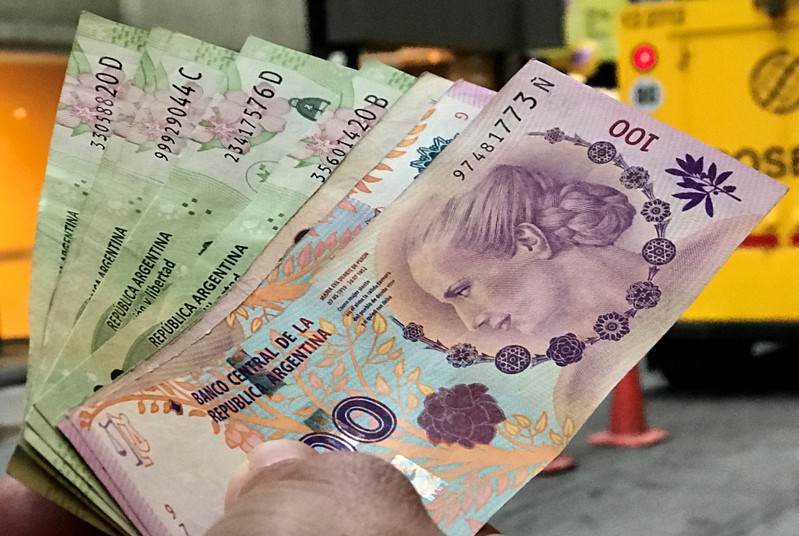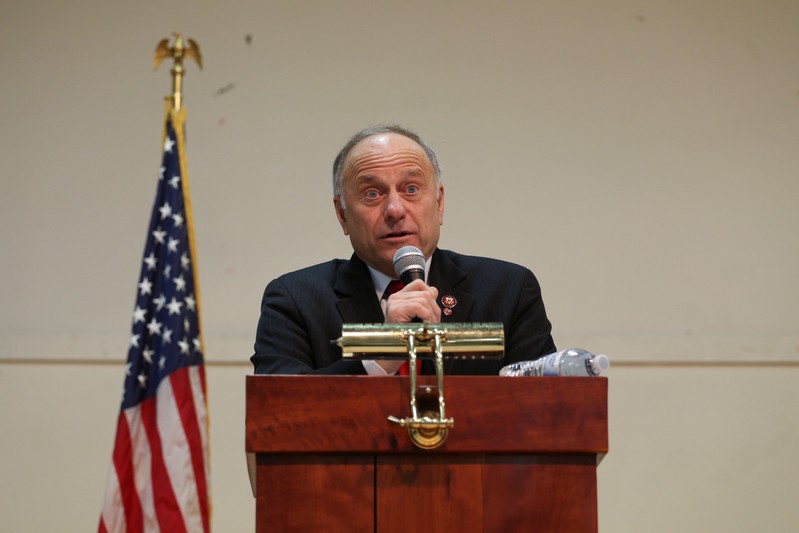
A man shows Argentine pesos outside a bank in Buenos Aires’ financial district, Argentina August 30, 2018. REUTERS/Marcos Brindicci
August 15, 2019
By Jorge Otaola and Gabriel Stargardter
BUENOS AIRES (Reuters) – Argentina’s beleaguered peso won back some recent losses on Thursday, jumping more than 5% after losing nearly a quarter of its value in the wake of a shock primary-election result on Sunday that once again plunged the country into economic chaos.
The peso began tumbling after center-left presidential candidate Alberto Fernandez, running alongside former leftist President Cristina Fernandez de Kirchner, unexpectedly trounced center-right President Mauricio Macri, whose austerity measures turned off voters, in the primary vote.
But the peso appeared to have turned a corner on Thursday, bucking three days of painful losses and surging 5.61% to 57 pesos per dollar, according to traders, who attributed the gains to profit-taking as investors snapped up cheap currency.
Fernandez’ strong showing led investors to sell Argentine assets, fearing a return to leftist policies and the end of free-market economic and structural reforms. Ever since a massive meltdown in 2001, Argentina’s economy has been blighted with weak growth, defaults and sky-high inflation.
Argentina’s lurch back into crisis comes amid widespread volatility and fears of a global recession triggered by the trade war between China and the United States, and protests in Hong Kong. Emerging markets have been particularly badly hit by recent volatility in global markets.
Speaking earlier in a radio interview, Fernandez said he was comfortable with an exchange rate of 60 pesos to the dollar.
“The dollar at 60 seems fine to me,” Fernandez said in comments before the market opened.
On Wednesday, the peso closed 7.14% weaker at 60.2 per dollar. Argentina’s Merval stock index has sunk by a staggering 34.47% since Sunday. It is due to open later on Thursday.
Macri announced a series of welfare subsidies and tax cuts for lower-income workers on Wednesday, in an awkward about-turn for a president who took office in 2015 vowing to slash public subsidies and to correct what he called years of leftist economic mismanagement.
Macri promised to raise the minimum wage, temporarily freeze gasoline prices and increase the income tax bracket floor by 20%. The new measures, which would cost about $678 million, would allow a tax cut for two million workers worth some 2,000 pesos ($33) per month per person, the government said.
In a bid to stem peso losses, the central bank sold $248 million from its reserves on Wednesday, bringing its total sales in reserve dollars to $503 million this week.
The bank has about $66 billion in reserves, of which about $20 billion are free resources that can be used to pay debt and stabilize the peso, according to an Argentine government official.
Debt payments for the remainder of 2019 are estimated at between $5 billion to $10 billion, depending on Argentina’s ability to roll over domestic Treasury bills, leaving a thin margin to intervene in the foreign exchange market.
There is an additional $27 billion in maturities in 2020, according to government data.
(Additional reporting by Eliana Raszewski, Cassandra Garrison and Walter Bianchi; Writing by Gabriel Stargardter; Editing by Bernadette Baum)

